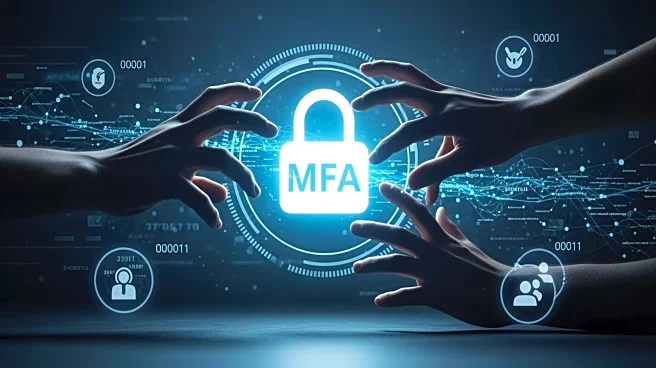What's Happening?
The Whisper 2FA phishing kit has emerged as a significant tool in credential theft campaigns, responsible for nearly one million phishing attacks since July 2025. According to Barracuda researchers, Whisper 2FA is notable for its use of AJAX technology,
enabling real-time communication between browser and server without page reloads. This allows the kit to capture credentials and multi-factor authentication (MFA) codes repeatedly until a valid token is obtained. The kit mimics brands like DocuSign, Adobe, and Microsoft 365, using urgent pretexts to lure users into submitting their details. The platform's rapid evolution includes advanced obfuscation techniques and anti-debugging features, making it difficult to detect and counter.
Why It's Important?
The rise of Whisper 2FA highlights the growing sophistication of phishing-as-a-service (PhaaS) operations. This development poses a significant threat to industries relying on MFA for security, as attackers can bypass these protections with ease. The kit's ability to continuously loop through credential attempts and validate stolen login codes in real-time represents a shift towards more complex and evasive phishing strategies. Organizations face increased risks as these kits become harder to detect and deploy, necessitating stronger defenses and continuous threat monitoring to protect sensitive data and maintain cybersecurity.
What's Next?
Organizations are advised to enhance their security measures by implementing layered security, phishing-resistant MFA, and continuous threat monitoring. As phishing kits like Whisper 2FA evolve, cybersecurity strategies must adapt to counter these sophisticated threats. The ongoing development of PhaaS platforms suggests that attackers will continue to refine their techniques, potentially leading to more advanced and widespread phishing campaigns. Stakeholders in cybersecurity must remain vigilant and proactive in addressing these challenges to safeguard against future attacks.
Beyond the Headlines
The evolution of phishing kits into full-service attack platforms reflects broader trends in cybercrime, where professional development and regular updates make these tools accessible to a wider range of attackers. This shift underscores the importance of cybersecurity education and awareness among users, as well as the need for robust security infrastructure to mitigate the impact of such threats. The ethical implications of PhaaS operations also raise concerns about the commercialization of cybercrime and the responsibilities of developers in preventing misuse of their technologies.

















